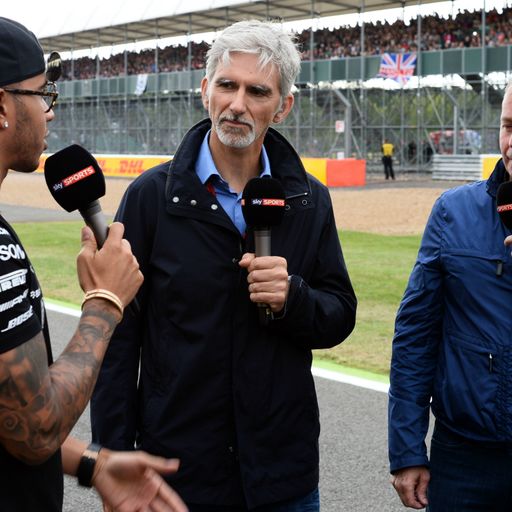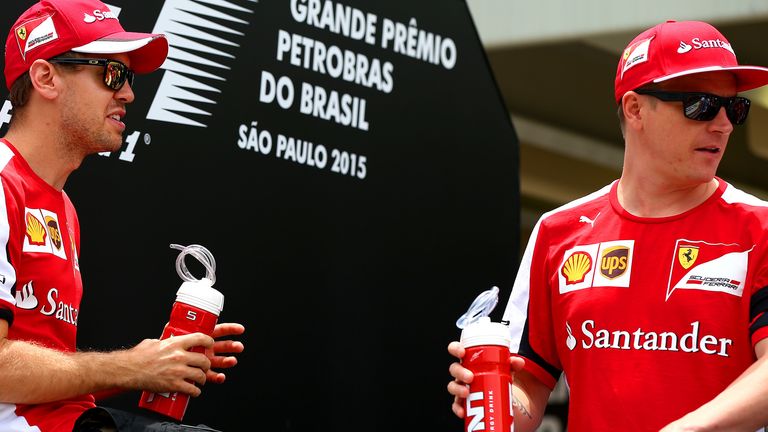Conclusions from the Brazilian GP
Why by playing fair on strategy Mercedes may have actually been unfair, Nico Rosberg proves little, and keeping Kimi Raikkonen could prove costly for Ferrari
Monday 16 November 2015 22:43, UK
Mercedes made to lose for winning well
That's the thing about F1. No matter how humdrum - or how much of a humdinger - a grand prix is, the sport's innate capacity to generate controversy and dispute remains an enduring constant. Pity Mercedes. They win again, they dominate again, they thrash the team with the biggest budget and lap just about everyone else, and all they receive is accusation instead of acclaim. Who'd be a winner in F1?
Damned if they did, damned if they didn't, the Mercedes hierarchy stand accused of blandly playing to the book rather than permitting Lewis Hamilton to throw strategic caution to the wind - better a gust than more dirty air from his team-mate's car? - in the Brazilian GP and risking ceding second place to Sebastian Vettel after Ferrari themselves switched strategy mid-race. In football, such luxurious dilemmas are usually termed a 'nice headache'. Outside of the sporting sphere, they tend to be gently mocked as first-world problems. In F1, it's just standard behaviour to depict the winners as the bad guys.
Mercedes probably should have let Hamilton flip strategy, but only because, as explained below, they were being unfair by trying to play fair. But the notion that they should have felt obliged to improve the show just because they have both titles in the bag is hogwash. If they boasted a winning package, Mercedes had every right to win the race however they liked. That's a winner's prerogative. If anyone had an issue with how Mercedes ran their race, the only right they had to argue was on the track. And unfortunately, with Ferrari over 10 seconds down the road and every other team lapped at least once, none of their rivals genuinely came close to challenging Mercedes at Interlagos.
The only team which doesn't deserve to be criticised for that mundane state of affairs is Mercedes. Contrary to the impression splashed across the backpages, both of their drivers were full permitted to race for victory and never once did the Mercedes pitwall call off Hamilton's pursuit or call on Rosberg to cool off.
Mercedes weren't the bad guys and they weren't the problem with the Brazilian GP. Nor was their strategy to blame for such a soporific 90 minutes. The problem - the only problem - was that nobody else gave them a race.
Mercedes' strategy missed a bigger picture
And the thing to appreciate about Mercedes' strategy is that its primary objective was to deliver the optimal result - a one-two finish - for the team. Which is exactly what it did.
Yet, while Mercedes were fully entitled to seek their team optimum, there was a flaw in Toto Wolff's resolute retort that keeping both drivers on the same strategy was the 'fair thing to do' and one which the Mercedes boss himself inadvertently highlighted when he observed:
"Running P2 was always going to be difficult at this track. As soon as you get close to the car in front, you lose downforce and the tyres start dropping off."
Mercedes would have known about that particular ugly characteristic of Interlagos long in advance. They would have also known there was a very strong likelihood that it would be one of their two cars running in P2 during Sunday's race. Mercedes boasted at least a half-second advantage in all three practice sessions and Interlagos, where last year's grid saw five teams monopolise the top-10 starting berths, has a well-deserved reputation for being a two-by-two 'Noah's Ark track'.
In sum, Mercedes should have known before the race that their determination to unify strategy could in actuality hinder and handicap one of their drivers and critically benefit the other. Once that is accepted, it's hardly a leap to declare that the race was effectively over once Rosberg had taken pole position and held the lead through the first corner.
The difficulty in splitting strategies is fear of disadvantaging the lead driver. "In advance you can only go by what you think the computer tells you, which strategy is best and it wouldn't really be fair for the guy who is running second to go for the other strategy and then for it to turn out it was the massively the quicker strategy in hindsight," pointed out Rosberg. But there was surely a 'fair' middleground for Mercedes to have sought out - namely, a 'compromise' which would have seen the team agree at the start of the weekend that if their cars were to run nose to dirty tail in the race they then the driver in second place would be offered the opportunity to try a different strategy but only after the lead runner had been given first choice on whether to take two or three stops. Would that have been fairer?
The risk on Sunday if strategies were split is Ferrari sneaking through to second place over the driver who took the sub-optimal route. But with both championships back in the Brackley trophy cabinet, would that have mattered much to Mercedes? Perhaps, but even that risk - and potential outcome - could have been, with a little clever spin and savvy PR, amply compensated by the positive publicity to be gleaned from Mercedes throwing caution to the wind to support the 'show' .
In hindsight, that might have been the most sensible strategy of all.
Rosberg's proof needs to be delivered in 2016
So what to make of Nico Rosberg's late-season revival? His back-to-back victories in Mexico and Brazil can both be regarded as too little, too late and a promising portent of what could follow in 2016 - especially with Hamilton suggesting that "since Singapore", when Mercedes introduced new components with next season primarily in mind, "the car has changed a bit which seems to have swung it towards him".
But Rosberg has proved nothing in the last couple of events that we didn't know already. It was already an established fact that on his day he is capable of beating Hamilton and when he is hot his single-lap pace is very hot. So much, so old. The issue still hanging over Nico is whether he is capable of maintaining this sort of form through a full calendar season and, deeper still, whether he can deliver faultless performances when the pressure is on and not when he has nothing left to lose. For that, we'll have to wait for 2016.
Keeping Kimi could prove costly
There are two established explanations for why Ferrari opted to keep Kimi Raikkonen for 2016. The first is that his retention carried the virtues of maintaining stability and the equilibrium which has inspired Sebastian Vettel's return to the peak of his powers. The second is that there was a shortage of viable alternatives and the contenders who did remain - most obviously, Daniel Ricciardo and Valtteri Bottas - were either under contract or too expensive.
The bottom line seems to be that Ferrari were unconvinced Bottas worked out as a value for money if they had to pay the reputed £10m compensation fee being demanded by Williams.
Raikkonen's form certainly can't have been a reason towards retention. In 2014, he scored 55 points to Fernando Alonso's 161 - just 25 per cent of Ferrari's overall tally. This season, he has 135 to Vettel's 266, a rather better return of 33 per cent but woefully inadequate nonetheless. It's clear that for next year's Drivers' Championship, Ferrari have put all of their eggs in their Vettel-named basket. But the increasingly glaring potential cost of keeping Raikkonen as the cheaper option for 2016 is that the Scuderia will pay a heavy price in next year's Constructors' Championship even if their car is a match for Mercedes'.
Max Attack is a treat
The first Sunday when Max Verstappen claims his maiden F1 victory - and you just know it will come complete with a trademark late-braking overtake - just can't come quickly enough.
PG







